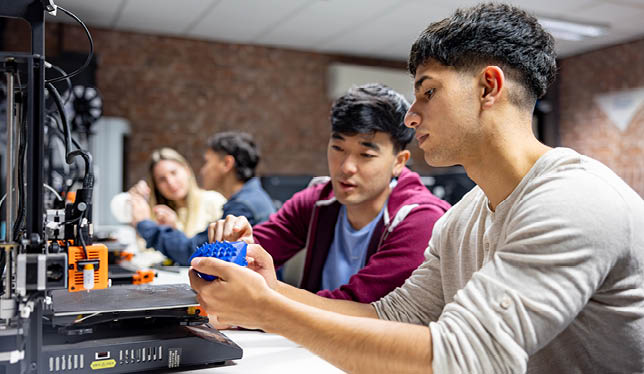Cultivating international student leadership self-efficacy
Self-efficacy is individuals’ own belief in themselves.

International students face many challenges and obstacles whenever they arrive in a new country. While there is a lot of scholarly literature available about international student experiences, challenges and engagement; there is limited research into international student leadership self-efficacy and development. Leadership self-efficacy specifically refers to an individual’s perceived sense of their own competence in specific leadership roles. While self-confidence is a generalized sense of competence and is considered a personality trait is mostly unlikely to change, leadership self-efficacy could be improved if higher education institutions support these students in developing leadership self-efficacy. This way they gain confidence and learn to work towards achieving their goals.
Through a series of semi-structured interviews, I was able to learn more about international students’ experiences in terms of leadership self-efficacy and leadership development. They spoke about a lack of support services, funding opportunities, employment availability and networking resources which made it challenging for them to pursue leadership opportunities. Major challenges faced by these students included language barriers, academic challenges, social networking, loneliness and financial strains. Furthermore, because of these challenges, students reported they did not socialize, were hesitant to participate in class and on-campus activities, and tended to avoid co-curricular activities.
Among the 10 students interviewed, only three participated in various extra or co-curricular activities on-campus, and reported gaining confidence in their leadership skills. They recounted that it took several months to adapt to their host culture and institution. But after observing their peers, the students began participating in various events across campus, making friends from their home country as well as from among the domestic student population. They joined organizations, clubs, and participated in multiple initiatives such as culture fest, weekly meetings, language learning programs, international friend’s circles and day-trips.
The other seven participants did not participate or engage in activities and/or events outside their classes for various reasons. Most of them reported they were not aware of co-curricular activities or social events, and did not feel able to meet other students in a social milieu due to language barriers and lower confidence. Not only did this group not interact with others on-campus outside their classes, they had very limited interaction during classes as well. Among these seven participants, two stated that they were not engaged in student programming because they wanted to focus on their academic goals. However, all seven participants did not feel they were capable of assuming leadership roles in their disciplines, mostly because they either were lacking leadership skills or reported needing encouragement to feel confident to lead. Language barriers, lack of mentors, limited support from tutoring and other support services, lower self-esteem/confidence, and limited interaction with their disciplines’ program coordinator and international department were major challenges that prevented these students from becoming involved in social or extra-curricular activities. The non-participating students also expressed regret, noting that while they excelled academically, they were missing out on opportunities to interact, connect, socialize and engage with others.
University campuses afford international students’ critical opportunities to mature and develop leadership skills: through learning experiences, extra activities, and programming that supports diverse students. Mentoring and peer interaction is also essential for self-efficacy leadership because mentees can learn and experience from their mentors. There is a stronger need for mentors who are able to support these students to develop leadership self-efficacy through different extra-curricular activities, can encourage and help them to seek support services when needed. Support services such as tutoring, counselling, mentoring, and advising is necessary to cultivate problem-solving skills, critical thinking, and communication skills which fosters not only their academic learning and development but also leadership self-efficacy. Participants felt their leadership skills improved and they were more confident because of their positive experiences and development by participating in extra-curricular activities, utilizing support services, and following their mentors.
Despite the small sample size, the interviews I conducted reinforced the need to develop effective student programming that is relevant to international students. Leadership opportunities and initiatives that focus on encouraging international students to participate in campus life helps them establish connections and cultivate a sense of belonging. Participants who were involved in on-campus activities had a greater sense of belonging and a more positive attitude overall.
Initiatives to introduce and integrate international students with local and domestic students can furthermore help them establish friendships. International students bring diverse experiences and backgrounds and are a great resource to foster multicultural understanding. Social-cultural events to foster intercultural understanding and friendship among domestic and international students will be beneficial for campus community as well. Friendships also afford international students an outlet get an to discuss their problems, which helps them feel encouraged and can serve as a coping mechanism to deal with stress.
International students need support as soon as they arrive on campus, which will help them interact with their peers, make friends, engage in activities to build interpersonal and leadership skills, and boost their confidence for leadership self-efficacy.
Featured Jobs
- Canada Excellence Research Chair in Computational Social Science, AI, and Democracy (Associate or Full Professor)McGill University
- Psychology - Assistant Professor (Speech-Language Pathology)University of Victoria
- Veterinary Medicine - Faculty Position (Large Animal Internal Medicine) University of Saskatchewan
- Canada Excellence Research Chair in Forest Biodiversity Conservation (Full Professor)University of New Brunswick
- Business – Lecturer or Assistant Professor, 2-year term (Strategic Management) McMaster University














Post a comment
University Affairs moderates all comments according to the following guidelines. If approved, comments generally appear within one business day. We may republish particularly insightful remarks in our print edition or elsewhere.